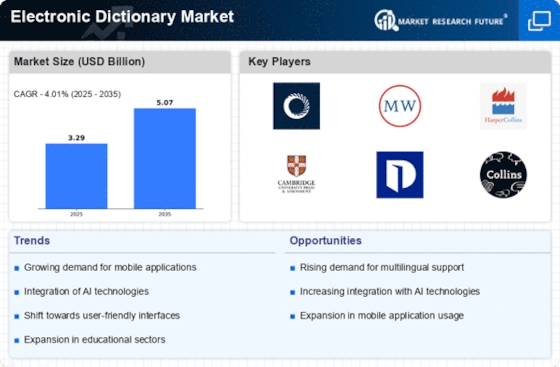Top Industry Leaders in the Electronic Dictionary Market

The Competitive Landscape of the Electronic Dictionary Market
In the realm of language learning and reference, the humble electronic dictionary has shed its bulky shell and embraced the digital realm. The Electronic Dictionary market hums with the activity of diverse players vying to provide the most comprehensive and accessible linguistic portals in your pocket. Understanding the strategies at play, the factors driving market share, and the rising stars reshaping the industry is crucial for anyone navigating this dynamic lexical landscape. Driven by factors like increasing global access to mobile technology, rising language learning aspirations, and expanding educational markets, the market is expected to exhibit sustained growth in the coming years.
Key Player:
- Canon Hanvon
- IFLYTEK
- Electronic Business Machines
- Ectaco Inc.
- Sharp Electronics
- Wisebrave
- Casio Computer Co., Ltd.
- Inventec Besta Co., Ltd.
- Noah Technology Holding
- Alfa Link (P.T. Freshindo Marketama)
Strategies Adopted by Market Leaders:
-
Content Expansion and Specialization: Industry giants like Casio, Ectaco, and Franklin invest heavily in expanding their language databases, offering specialized dictionaries for niche fields like medicine, law, or finance, catering to diverse user needs. -
Integration with Digital Learning Platforms: Leading players prioritize seamless integration with language learning apps and online platforms, creating a holistic learning experience and attracting tech-savvy users. -
Focus on User Experience and Interface Design: Established companies prioritize intuitive interfaces, voice search capabilities, and personalized learning features, differentiating platforms and enhancing user engagement. -
Multi-platform Accessibility: Offering offline accessibility, mobile app versions, and compatibility with multiple operating systems expands market reach and attracts users across a range of devices.
Factors for Market Share Analysis:
-
Content Accuracy and Depth: Providing precise definitions, comprehensive vocabulary, and reliable word translations are essential for user trust and effective language learning. Companies offering the most accurate and in-depth content gain an edge. -
Pedagogical Features and Integration: Learning tools like quizzes, pronunciation guides, and contextual examples differentiate platforms and cater to users seeking active language acquisition. -
Offline Accessibility and Battery Life: Ensuring smooth functionality without an internet connection and offering extended battery life are crucial for students and travelers, particularly in developing markets. -
Price and Value Proposition: Balancing advanced features with affordability and offering flexible subscription models or tiered pricing options attracts budget-conscious users and expands market reach.
New and Emerging Companies:
The market is witnessing a surge of innovative startups offering niche solutions. Lingodeer, for example, specializes in AI-powered contextual translations and interactive learning games, making language acquisition engaging and immersive. Another player, Babbel, focuses on personalized learning algorithms and bite-sized lesson formats, ideal for busy professionals seeking on-the-go language acquisition. Additionally, companies like Reverso and LingoDeer offer real-time translation tools and community-driven content creation, fostering collaborative learning environments.
Industry Developments:
- Nov 2023, Logitech International: Launched the Logitech Pen with built-in dictionary functionality, allowing users to look up words directly on paper documents.
- Dec 2023, Google: Enhanced Google Translate with contextual dictionary explanations, providing deeper understanding of translated words.









